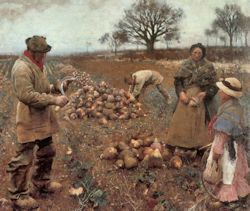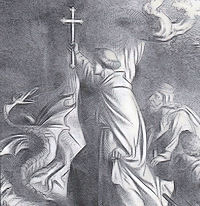Ordinary Time: September 2nd
Monday of the Twenty-Second Week in Ordinary Time; Labor Day (USA)
Other Commemorations: St. Agricola, Bishop (RM)
» Enjoy our Liturgical Seasons series of e-books!
The Roman Martyrology commemorates St. Agricola (also known as Agricolus) (625-700), son of St. Magnus and bishop of Avignon, France. He built a church in Avignon to be served by the monks of Lerins and also a convent for Benedictine nuns. By his blessing, he put an end to an invasion of storks.
Today is Labor Day in the United States of America.
Meditation on Work
 God's fundamental and original intention with regard to man, whom he created in his image and after his likeness, was not withdrawn or canceled out even when man, having broken the original covenant with God, heard the words: "In the sweat of your face you shall eat bread." These words refer to the sometimes heavy toil that from then onward has accompanied human work; but they do not alter the fact that work is the means whereby man achieves that "dominion" which is proper to him over the visible world, by "subjecting" the earth. Toil is something that is universally known, for it is universally experienced. It is familiar to those doing physical work under sometimes exceptionally laborious conditions. It is familiar not only to agricultural workers, who spend long days working the land, which sometimes "bears thorns and thistles," but also to those who work in mines and quarries, to steelworkers at their blast furnaces, to those who work in builders' yards and in construction work, often in danger of injury or death. It is also familiar to those at an intellectual workbench; to scientists; to those who bear the burden of grave responsibility for decisions that will have a vast impact on society. It is familiar to doctors and nurses, who spend days and nights at their patients' bedside. It is familiar to women, who sometimes without proper recognition on the part of society and even of their own families bear the daily burden and responsibility for their homes and the upbringing of their children. It is familiar to all workers and, since work is a universal calling, it is familiar to everyone.
God's fundamental and original intention with regard to man, whom he created in his image and after his likeness, was not withdrawn or canceled out even when man, having broken the original covenant with God, heard the words: "In the sweat of your face you shall eat bread." These words refer to the sometimes heavy toil that from then onward has accompanied human work; but they do not alter the fact that work is the means whereby man achieves that "dominion" which is proper to him over the visible world, by "subjecting" the earth. Toil is something that is universally known, for it is universally experienced. It is familiar to those doing physical work under sometimes exceptionally laborious conditions. It is familiar not only to agricultural workers, who spend long days working the land, which sometimes "bears thorns and thistles," but also to those who work in mines and quarries, to steelworkers at their blast furnaces, to those who work in builders' yards and in construction work, often in danger of injury or death. It is also familiar to those at an intellectual workbench; to scientists; to those who bear the burden of grave responsibility for decisions that will have a vast impact on society. It is familiar to doctors and nurses, who spend days and nights at their patients' bedside. It is familiar to women, who sometimes without proper recognition on the part of society and even of their own families bear the daily burden and responsibility for their homes and the upbringing of their children. It is familiar to all workers and, since work is a universal calling, it is familiar to everyone.
And yet in spite of all this toil—perhaps, in a sense, because of it—work is a good thing for man. Even though it bears the mark of a "bonum arduum," in the terminology of St. Thomas, this does not take away the fact that, as such, it is a good thing for man. It is not only good in the sense that it is useful or something to enjoy it is also good as being something worthy, that is to say, something that corresponds to man's dignity, that expresses this dignity and increases it. If one wishes to define more clearly the ethical meaning of work, it is this truth that one must particularly keep in mind. Work is a good thing for man—a good thing for his humanity—because through work man not only transforms nature, adapting it to his own needs, but he also achieves fulfillment as a human being and indeed in a sense becomes "more a human being."
Without this consideration it is impossible to understand the meaning of the virtue of industriousness, and more particularly it is impossible to understand why industriousness should be a virtue: For virtue, as a moral habit, is something whereby man becomes good as man. This fact in no way alters our justifiable anxiety that in work, whereby matter gains in nobility, man himself should not experience a lowering of his own dignity. Again, it is well known that it is possible to use work in various ways against man, that it is possible to punish man with the system of forced labor in concentration camps, that work can be made into a means for oppressing man, and that in various ways it is possible to exploit human labor, that is to say, the worker. All this pleads in favor of the moral obligation to link industriousness as a virtue with the social order of work, which will enable man to become in work "more a human being" and not be degraded by it not only because of the wearing out of his physical strength (which, at least up to a certain point, is inevitable), but especially through damage to the dignity and subjectivity that are proper to him.
—Excerpted from Laborem Exercens
Highlights and Things to Do:
- From Catholic Culture's Library:
St. Agricola
The son of a Gallo-Roman senator named Magnus, St. Agricola entered the monastery about the age of 14, possibly after the death of his mother, and acquired a great reputation for piety and learning. Meanwhile, his widowed father, Magnus, received Holy Orders and became a monk. Magnus was named bishop of Avignon 16 years later, and he consecrated his son, who by then had been a priest for quite some time, to become coadjutor bishop. St. Agricola succeeded his father ten years later and became famous for preaching and aid to the sick and poor. Depicted here with a dragon, St. Agricola, like Sts. George, Arsacius and Margaret of Antioch, is considered to have done battle with the devil–not utilizing his own weak human will, but shielded with a crucifix, much prayer, fasting and faith in his Redeemer. As bishop of Avignon, St. Agricola worked all the harder for the sake of his flock. St. Agricola lived from 625-700. He was named Patron of Avignon in 1647.
—Excerpted from 2009 Saints Calendar, Tan Books and Publishers
Patronage: Avignon; against misfortune; against plague epidemics; for rain; for good weather; storks; for good harvests; against gambling; against misfortune of all kinds
Symbols and Representation: storks
Highlights and Things To Do:
- For more information on this saints, see
- St. Agricola is one of the saints: Which Saint to pray for fighting against a Covid infection? A short survey
- The Church of St. Agricola (Eglise Saint-Agricol), built in the 1300s in Avignon, is one of the oldest Catholic churches still standing in Avignon, France. See these sites for more details:
- St. Agricola predates the Avignon Papacy, one of the black marks on the Church's history. However, that doesn't keep us from toasting to this saint's honor with some delicious Châteauneuf-du-Pape wine. Read a longer history here.
- Agricola is the Latin word for farmer. It is unclear if St. Agricola's patronage for good harvests and weather is derived from his name or from his life. Either way, this is another saint to invoke for help and success in gardening, homesteading, and farming. And of course, the next time your land is invaded by a flock of storks, definitely call on St. Agricola.






